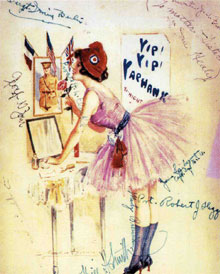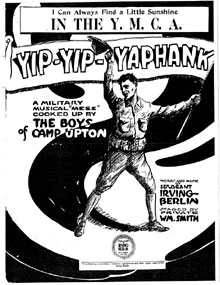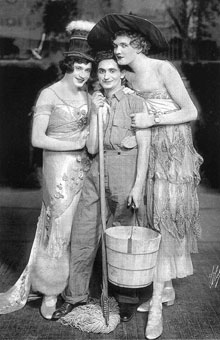American Classics



Yip! Yip! Yaphank! was a critically acclaimed concert musical production presented by American Classics in 2010.
Please click here to listen to selections from the show.
"American Classics gave the first ever revival of Irving Berlin's WWI Revue Yip! Yip! Yaphank!. After hearing the score, one has to ask the question, who doesn't love Irving Berlin?" - Lloyd Schwartz, Boston Phoenix,, 4/21/10
In early 1918, along with thousands of other American men between the ages of 18 and 45, Irving Berlin was drafted into the Army. He was in the middle age range, at not quite 30 (see photo). By this time Berlin was one of Tin Pan Alley and Broadway's leading musical figures, with many hit songs to his credit and two successful Broadway shows. His well-established working habits were to write songs all night, in part because he found he simply could not fall asleep at the hours that most people did.
Berlin was sent to Camp Upton in Yaphank on Long Island. "Lying there at night listening to the strange sounds that came from the other cots made me realize for the first time that I wasn't going to like Army life," Berlin wrote many years later. "I have no idea what time I fell asleep, but I woke with a start and heard for the first time the bugler who was to become my pet aversion and the inspiration for 'Oh, How I Hate to Get Up in the Morning.'" Berlin conceived the idea of writing a show for the troops at Camp Upton, initially to provide work for the other show business enlistees. He sold the idea to the Camp commander, who allowed him to work at his usual hours, not Army time. Berlin was more than happy to provide a show – gratis – in order to stay up all night and sleep past reveille.
Berlin titled his show Yip! Yip! Yaphank! It was ultimately called Uncle Sam Presents Yip Yip Yaphank, A Military "Mess" Cooked Up by the Boys of Camp Upton. As it was an Army show, the cast was all-male, with the "boys" taking the female parts, including the parody Floradora Sextet. It was ready for a July performance for the military chiefs at Camp Upton's own theatre, with the hope of getting backing from the military brass to move the show to New York City's Century Theatre as a fundraiser to build Camp Upton's community center. The opening night was a star-studded affair with many New York celebrities, including Will Rogers, Al Jolson, and Fanny Brice, in attendance.

The show did move to the Century, opening there on August 19, 1918, then on September 9 it transferred to the Lexington Avenue Opera House for a combined run of thirty-two performances. Stars again filled the opening night audience, this time including Irene Castle, who had appeared in Berlin's first Broadway show, Watch Your Step, and Berlin's show business hero, George M. Cohan.
Traditional minstrelsy provided the format for the show, which was a revue, not a book musical; thus, like a minstrel show, it was a series of songs and acts with a common theme of army life. There were two breaks with minstrel tradition, though. One was the dress, which was army khaki. The other was that only the men on the ends of the minstrel line were in blackface. Blackface was quite common in theatre in the early twentieth century and its minimal use by Berlin reflects his changing attitude toward ethnic humor in the theatre and songwriting at this time; it was at this point in his career that he abandoned such songs.
In keeping with the revue format and to feature the local talent of Camp Upton, the show was littered with acrobats, jugglers, dancers, and a boxing specialty by the world lightweight champion, Benny Leonard. Much of the show's choreography was military drills, set to Berlin's syncopations. Given the all-male cast, it was inevitable that a drag routine was part of the proceedings, with imitations of current Broadway stars Marilyn Miller, Ann Pennington, and others, along with a Ziegfeld-style chorus line of "beauties" portrayed by the Army boys.
There were variety and novelty acts that were seen during the "solos," "Page Boys," and "Follies" sections of the show. Joe Jackson and his bicycle are mentioned in the "Page Boys" number. Jackson (1873-1942) is now largely forgotten, but he was a leading vaudevillian at the time of the first World War and his son, Joe Jackson, Jr., took over the act.

Berlin had gotten his start in show business as a performer. By 1918 he was not appearing onstage regularly but was still known as a singer of his own songs. His appearance in Yip! Yip! Yaphank! was an "eleven o'clock" number which truly occurred at just about eleven o'clock. One of Camp Upton's tents was seen onstage, with calls for Sergeant Berlin, who was presumably inside the tent. Eventually Berlin was dragged, apparently still asleep, from the tent to regale the audience with "Oh! How I Hate to Get Up in the Morning." He reappeared later in the show with a mop and pail singing "Kitchen Police."
A note on "The Sterling Silver Moon:" Audiences will recognize the music and lyric as "Mandy," though not quite the version expected. Berlin wrote this version first, and while it was always well received in performance it did not seem to be selling in sheet music. He discovered by chance when visiting a music store that people were requesting a song called "Mandy," only to be told there was no such song. Quickly he recalled the copies of "Sterling Silver Moon" and put new covers on them with the new title "Mandy." For the Ziegfeld Follies of 1919 he rewrote the song under the new title in the version known today (best remembered as a big production number in White Christmas). The revised "Mandy" is the better of the two, but the original has a great deal of charm and is fun to hear.
Another unusual aspect of this number is that a woman – not one of the men in drag – appeared onstage as Mandy. These performances follow the precedent of featuring a female, though our lady is not featured as Mandy.
The closing night has entered Irving Berlin lore. The cast sang "We're on Our Way to France," marching down the aisles to go to board the ships in Hoboken to join the fighting soldiers in Europe. Since then there have been no revivals, making the present performances unique.
A bit of Yip! Yip! Yaphank! can be seen in two Irving Berlin films. Alexander's Ragtime Band (1938) has a World War I section featuring songs from the show and a recreation of the famous closing night (done in Hollywood style). The 1943 film version of Berlin's World War II show, This is the Army (1942), also used the closing night scene but more famously featured Berlin himself singing "Oh! How I Hate to Get Up in the Morning" as it was done in 1918.
– Benjamin Sears
Hear Selections from Yip! Yip! Yaphank!